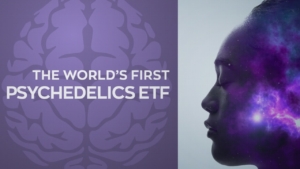
Psychedelics and grief share a surprising kinship. Both are shrouded in societal taboos and folklore mysticism that places them at cultural outskirts and conversations. More importantly, they are both a delicate, natural and ancient human experience that it seems the world may finally be ready to learn not just about —but learn from.
What we know well is that grief is an emotional and bodily traumatic event that rewires the brain, much like PTSD. When a bond is formed, there are significant changes to the way those proteins are folded in the nucleus accumbens of the brain. Over time, our neurons are devoted to firing in a certain pattern and with it, devoted to this bond or a partner. The nucleus accumbens plays a motivational role in our reward system responsible for feeding, sexual behavior, stress and drug self-administration, aka addiction. Drugs like heroin and cocaine activate and disrupt this same reward system. The comparison between love and its drug-like addictive effects is a widespread theme, but we are growing privy to the fact that grief chemically functions along that same neural pathway. The lacking bond or missing person causes this loss to be a shock to our reward, nervous, limbic and physiological systems. In other words, it rocks your entire world and in a devastating way —at first.
Neurologist, Lisa M. Shulman says that “grief is an evolutionary adaptation to promote survival in the face of emotional trauma.” Thinking of grief as a tool for transformation is a relatively new idea. Most household conceptions about grief are in fact outdated like the “five stages of grief” otherwise known as The Kübler-Ross model introduced by Elisabeth Kübler-Ross in 1969. This model was actually shaped off of the series of emotions experienced by a person who is dying, not necessarily grieving. It still became a tangible and accepted explanation of the complex and abstract emotional upheavals one experiences during the varying phases along their grief journey. The last stage was once reaching a point of inevitable acceptance, but it was her protege and partner, David Kessler, today’s most popular media expert on “Grief and Grieving,” that shifted the layman’s narrative in 2019 with his book Finding Meaning: The Sixth Stage of Grief. Since then, new-age grief work like experiential retreats or writing workshops such as the Make Meaning Workshop, provide avenues to alchemize their grief into meaning.
This critical sixth step to find meaning offers a bridge between grief and a more fulfilled and emotionally balanced life. But this innate ability to adapt to the shock of grief by making meaning from it was explored in Dr. Robert A. Neimeyer’s book Meaning Reconstruction and The Experience of Loss published in 2001. Very similar to psychedelic integration models, Neimeyer discusses Meaning-Reconstruction Theory as the capacity to reconstruct, reshape and rethink our experiences or stages of bereavement to initiate recovery and personal growth beyond our previous capacities.
This seemingly simple “sixth step” of grief can present itself as a perilous and daunting task for the average bereaved person, but if one successfully practices the process and skill of creating or reconstructing meaning, then one successfully integrates a new evolutionary coping mechanism and life tool for the brain, body and spirit.
It is an emotional excavation and reconstruction that asks us to explore the depths and caverns of our most treacherous memories to essentially form new bonds in the brain. This is where psychedelic-assisted therapies come into play for those seeking more holistic and nuanced approaches to overcome prolonged grief. Psychedelics help those grieving in the similar ways that psychedelics have been proven to help heroin addicts, PTSD victims and those who have experienced traumatic events. They help access memories and pivotal events that have negatively altered the reward system in order to confront and offer their brain a path to reconstruct them in a positive way.
New-age grief work looks at symptoms of bereavement or “stages of grief” as opportunities or entry points for meaning reconstruction to take place. Psychedelic-assisted therapies provide a catalyst to meaning reconstruction, among countless other benefits. Nonetheless, new-age grief work and psychedelic-assisted therapies have similar methodologies. They encourage self-exploration and the notion that we have all we need within ourselves to find true healing and growth if we can only take the pieces of what was to create and admire what now is.





